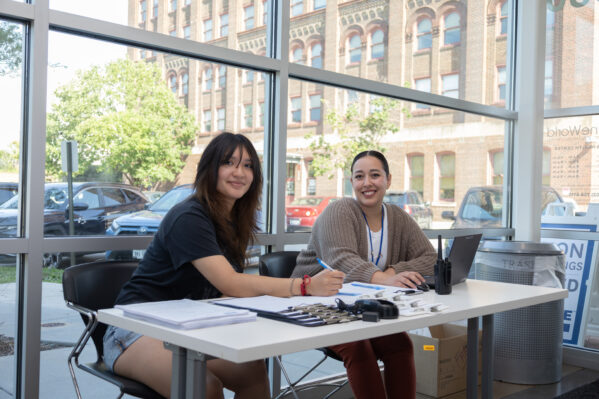Patient Support Team prepares, educates and empowers patients

While clinicians provide direct care to patients, the Patient Support Team helps open doors for people who need it. This team has three key functions: language services, referrals and case management.
Case managers provide support for cervical cases, breast cases, some aspects of tuberculosis cases and more. Meanwhile, interpreters from the team can provide in-person support for patients who speak Q’anjobal and Karen.
“I think that’s what sets us apart as well,” said Patient Support Supervisor Yesenia Chavez. “We’re not just trying to schedule and get them out of the door. We’re forming that relationship and we’re making the patient feel comfortable.”
***
It all goes back to a binder. Like Mary Poppins’ magic bag, just the right thing can be summoned from the binder at just the right time – if you know how to use it.
Inside the binder are resources that help OneWorld patients tap into additional health services, or referrals. It’s the job of the Referral Care Coordinators (RCCs) to know the myriad resources contained within the binder and how these resources can be applied to a patient’s specific needs.
For example, a patient who comes to their primary care provider for a concern might need a referral to a cardiologist. After the primary care appointment, the team of RCCs is tapped to find an appropriate specialist, while working with the patient to overcome any barriers that stand in the way of taking the next step for care.
“It’s a lot more than just getting them scheduled,” said Patient Support Supervisor Yesenia Chavez. “It really is helping them in every aspect of their referral, so that, one, they feel comfortable going to that appointment, and then two, feeling comfortable also accepting another referral that would come after that.”
At OneWorld, patients could be referred within the organization to services like ultrasounds, X-rays and an autism clinic. External referrals include specialized services and provider visits. Still other specialty services, like mobile mammography and vision screening units, may be offered at OneWorld thanks to partnerships with other health care organizations.
Preparedness is key to a successful referral. Before reaching out to a patient, Chavez said her team has already reviewed the medical chart and investigated options for services. In addition to making the service referral itself, RCCs may screen patients for financial assistance programs, offer information about low-cost clinics, identify transportation options and highlight other programs the patient could qualify for.
“I could do 10 cardiology referrals and all those 10 cardiology referrals will be different, which I think makes our role special,” Chavez said. “But our goal is just to offer patients everything possible to get them to their appointments.”
Chavez said her team strives to empower patients by giving them information, so they can continue to access care in the future. And she also wants to equip patients with resources that they may not otherwise know about. An expensive study, for example, could discourage a patient from moving forward with care, but the Patient Care Team might know of payment plans or financial assistance programs that could put expensive care within reach.
“I think my team is just always ready to step in,” Chavez said. “With our referral process right now, we’re really focused on the education piece and giving the patient that empowerment of, ‘You can do this! You can call and schedule your appointment. We’ll show you how. We’ll send everything you need.’”



